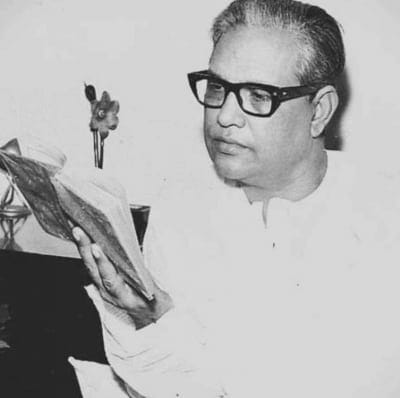Mumbai, Oct 1 : One of the finest poets of 20th century Urdu literature, Majrooh Sultanpuri was born on this day 101 years ago. His contribution to the Hindi film industry as a lyricist is also phenomenal, so much so that any writing or research work on the Bollywood music scene would be incomplete without his mention.
Born Asrar ul Hassan Khan on October 1, 1919 in Sultanpur, currently in Uttar Pradesh. Sultanpuri has penned countless memorable songs in his career spanning six decades, and has collaborated with talented musicians spanning generations, from Sachin Dev Burman to Rahul Dev Burman to Jatin-Lalit. He has been honoured with the prestigious Dadasaheb Phalke Award among numerous other recognitions.
It is impossible to sum up such a genius’ oeuvre in a list of a few songs. IANS takes a look into some of Majrooh’s popular songs that you may want to hum while you think of the great creative artiste.
CHHOD DO ANCHAL (PAYING GUEST, 1957)
The peppy number written by Sultanpuri featured in Subodh Mukherjee’s “Paying Guest” starring Dev Anand and Nutan. The song was composed by Sachin Dev Burman while vocals were lent by Kishore Kumar and Asha Bhosle. “Maana janaab ne pukara nahin” is another popular song written by Sultanpuri from the film.
BAAR BAAR DEKHO (CHINA TOWN, 1962)
The magical number composed by Ravi is voiced by Mohammed Rafi. The song features in Shakti Samanta’s 1962 directorial “China Town”, starring Shammi Kapoor, Shakila and Helen.
CHAHUNGA MAIN TUJHE (DOSTI, 1964) Majrooh Sultanpuri wrote this song for composers Laxmikant–Pyarelal, and Mohammed Rafi sang the number with characteristic depth. The song continues to be the definitive Bollywood ode to ‘dosti’, or friendship.
YEH DIL NA HOTA BECHARA (JEWEL THIEF, 1967)
This rhythmic number written by Sultanpuri and composed by Sachin Dev Burman was sung by Kishore Kumar. It featured in Vijay Anand’s “Jewel Thief” starring Dev Anand and Vyjayanthimala. Other popular songs written by Sultanpuri for this album include “Raat akeli hai”, “Aasman ke neeche”, “Dil pukaare aa re” and “Hothon mein aisi baat”.
O MERE DIL KE CHAIN (MERE JEEVAN SAATHI, 1972)
Penned by Sultanpuri, Kishore Kumar sung the track composed by Rahul Dev Burman for Ravikant Nagaich’s “Mere Jeevan Saathi”, starring Rajesh Khanna and Tanuja. Other popular songs in this album include “Aao na gale lag jao na” and “Chala jaata hoon”.
TERE MERE MILAN KI YEH RAINA (ABHIMAAN, 1973)
This is one of the best creations of Sultanpuri, which continues to enjoy a timeless charm. The song has been composed by Sachin Dev Burman and sung by Lata Mangeshkar and Kishore Kumar. It featured in Hrishikesh Mukherjee’s “Abhimaan” starring Amitabh and Jaya Bachchan. Other notable songs penned by Sultanpuri for this album include “Piya bina”, “Meet na mila re man ka” and “Teri bindiya re”.
MERI BHEEGI BHEEGI SI (ANAMIKA, 1973) Magical and haunting, the number penned by Sultanpuri and composed by Rahul Dev Burman is sung by Kishore Kumar, and features in Raghunath Jalani’s directorial “Anamika” starring Sanjeev Kumar and Jaya Bachchan. Lata Mangeshkar’s “Baahon mein chale aao” is another gem Sultanpuri wrote for this album.
CHURA LIYA HAI TUMNE (YAADON KI BAARAAT, 1973): Asha Bhosle’s sensuous lilt brought alive the number, coupled with the resonance Mohammad Rafi’s voice rendered to it. Every song of the RD Burman-Majrooh Sultanpuri combo in the album continues to be popular till date. These include “Lekar hum deewana dil”, “Yaadon ki baarat”, “O meri soni meri tamanna” and “Aapke kamre mein koi rehta hai”.
OH HANSINI (ZEHREELA INSAAN, 1974)
This is another timeless collaboration of Sultanpuri and Rahul Dev Burman. Sung by Kishore Kumar, the song featured in Puttanna Kanagal’s “Zehreela Insaan” featuring Rishi Kapoor and Moushumi Chatterjee.
PAPA KEHTE HAIN (QAYAMAT SE QAYAMAT TAK, 1988) The song that literally marked Aamir Khan’s entry into the highway to superstardom was also a testimony of how adaptable Sultanpuri could be, when it came to penning numbers that automatically clicked with Gen-Now tastes. Over two decades later, the song that made Udit Narayan a household name, continues to be a defining anthem of youth.
Disclaimer: This story is auto-generated from IANS service.

